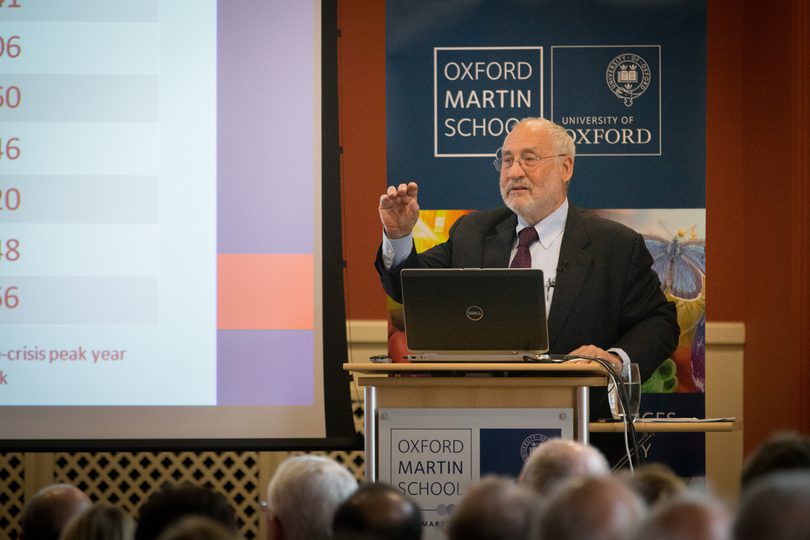
Eminent economist Professor Joseph Stiglitz warned that the lack of a robust recovery from the financial crisis could lead “not just to a lost decade but a lost quarter century”, in his lecture at the Oxford Martin School last week.
Addressing what he called "the North Atlantic Malaise", the Nobel Prize winner and former World Bank Chief Economist said growth was still "anaemic", with 19.5 million in the US unable to find a full time job, and Europe experiencing an even worse situation. “If you tell most Americans the recession is over they’ll laugh at you – it’s not showing in their pocketbook. The median income of a full time male worker now is lower than it was 40 years ago.”
Examining why the recovery had been so slow, he gave the example of the premature cutbacks that followed the success of the New Deal in the 1930s, and led to a new recession, saying he believed that the global economy would have been in a better position than its current one had austerity measures not been deployed in the aftermath of the 2008 crisis. “We are in the deepest downturn since the Great Depression, and the longest, and the end is not yet in sight. A lot of people are expressing relief that the European recession has come to an end; they’re making a big confusion between the end of a recession and a robust recovery,” he said.
In Europe, said Professor Stiglitz, Germany’s recovery was held up as an example of success, but in any other context would be viewed as a failure. He said the euro lacked the political momentum to really make it work, due to the “neoliberal ideology” prevalent at the time of its creation which had resulted in a lack of institutions required to make it a success. And while the US had been able to “write a blank cheque” following the financial crash, eurozone countries were unable to control their own printing presses and had to turn to borrowing foreign currency, creating a sovereign debt crisis.
Dysfunctional financial systems, austerity measures, global imbalances and a lack of structural transformation were all hampering economic recovery, he said, but warned against creating another bubble, saying: “It might get consumption going but it doesn’t get investment going.” Rising inequality was also to blame, he stated, with 95 per cent of US wage gains since 2009 going to the top one per cent. “The bottom line is that world needs more fiscal stimulus, but politics in the US and the UK make that unlikely,” he concluded. “My outlook is that we are in for a hard ride. The prospects remain dismal.”
- Watch the video of Professor Stiglitz's lecture
- View images from the event
- Find out about other Oxford Martin School events